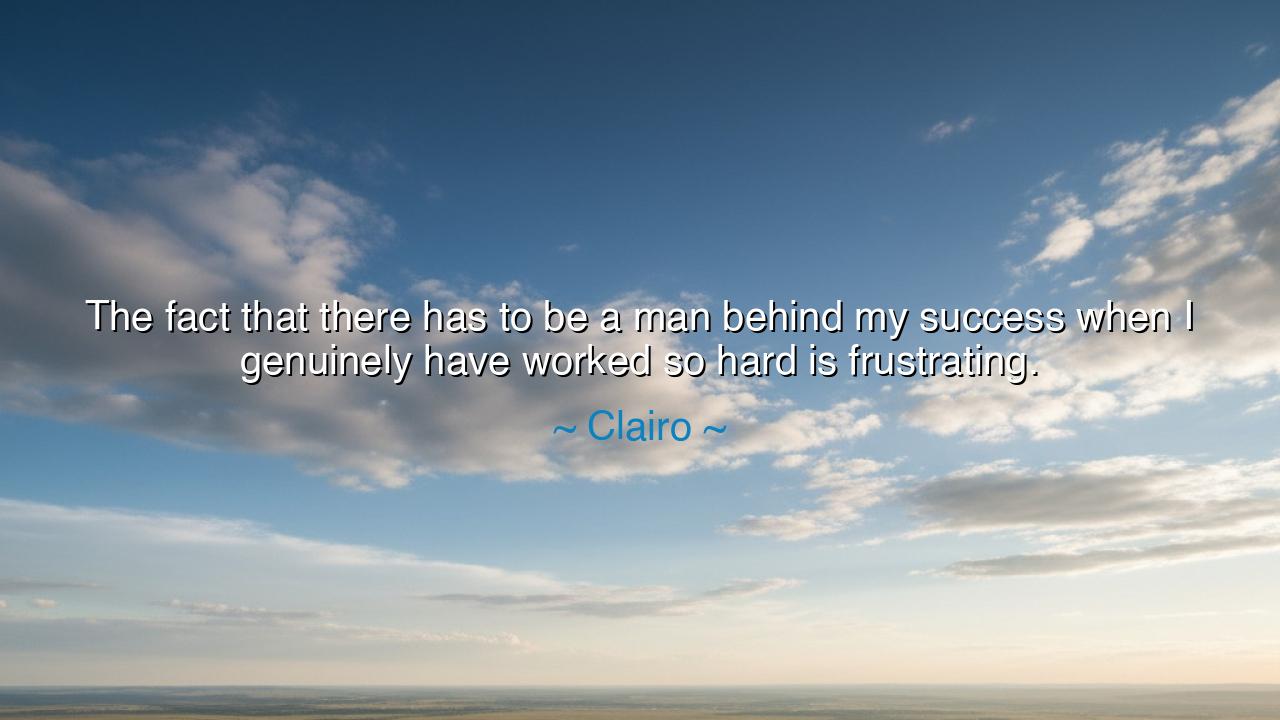
The fact that there has to be a man behind my success when I
The fact that there has to be a man behind my success when I genuinely have worked so hard is frustrating.






Hear the voice of Clairo, who declared: “The fact that there has to be a man behind my success when I genuinely have worked so hard is frustrating.” In this lament burns the sorrow and the anger of countless women across the ages, who have toiled with devotion, who have built their craft with sweat and blood, yet have seen their triumphs credited not to their labor, but to the shadow of a man. Her words are the cry of one who longs not for borrowed recognition, but for truth—that success, when earned, belongs to the one who bore the weight of the struggle.
The ancients knew this injustice well. In Rome and in Greece, women who shaped art, poetry, and philosophy often had their names erased, their works attributed to men, their influence buried beneath the pride of patriarchs. Yet still, they labored. Still, they created. Their voices, like Clairo’s, remind us that the fight for recognition is as much a part of the human story as the creation of art itself. For what use is hard work if the world refuses to acknowledge the hand that shaped it?
Consider the life of Rosalind Franklin, the brilliant scientist whose x-ray photographs were pivotal in the discovery of DNA’s double-helix structure. Though her work provided the key, it was Watson and Crick who received the glory, their names immortalized while hers lingered in the shadows. She, too, bore the frustration that Clairo speaks of—that her labor, her intellect, her brilliance, was obscured by the assumption that true achievement must be credited to men. History, however, whispers her name with reverence now, proving that truth, though delayed, cannot be silenced.
Clairo’s words also reveal the deeper wound of frustration—for when one’s effort is ceaseless and one’s dedication genuine, to be told that another, unseen and unworthy, is the reason for your rise is to have your very self stripped from you. It is to be denied ownership of your own story. Yet even in her frustration, there is fire: a refusal to accept falsehood, a demand that her success be seen for what it is—the fruit of her own perseverance, her own creativity, her own will.
This teaching is not hers alone, but for all who labor in the face of doubt. Success must be claimed with courage, and the world must be reminded again and again that greatness belongs not to those who overshadow, but to those who endure. Recognition is not always freely given; sometimes it must be seized. And sometimes, the greatest victory is not only in creating, but in standing firm and declaring, “This work is mine.”
To you who hear this, take the lesson: do not let others write your story in their ink. If you have labored, if you have sacrificed, if you have poured your soul into the work of your hands, do not surrender its honor to another. Speak boldly of your effort. Do not wait for permission to claim your triumph. For the world is quick to give credit elsewhere, but truth must be defended.
Practical wisdom follows: document your efforts, build your voice, and surround yourself with those who will witness and affirm your journey. Lift others as you rise, so that the pattern of erasure may be broken, and future generations will not know the same frustration. Above all, never diminish your own struggle to make others comfortable—your hard work deserves the dignity of recognition.
Thus, remember Clairo’s cry: success belongs to those who earn it. Do not allow shadows to obscure your light. Stand in the fullness of your labor, and let the world see—not the myth of a man behind you, but the truth of your own strength. For only then will justice be done, and your story told rightly for those who come after.






AAdministratorAdministrator
Welcome, honored guests. Please leave a comment, we will respond soon